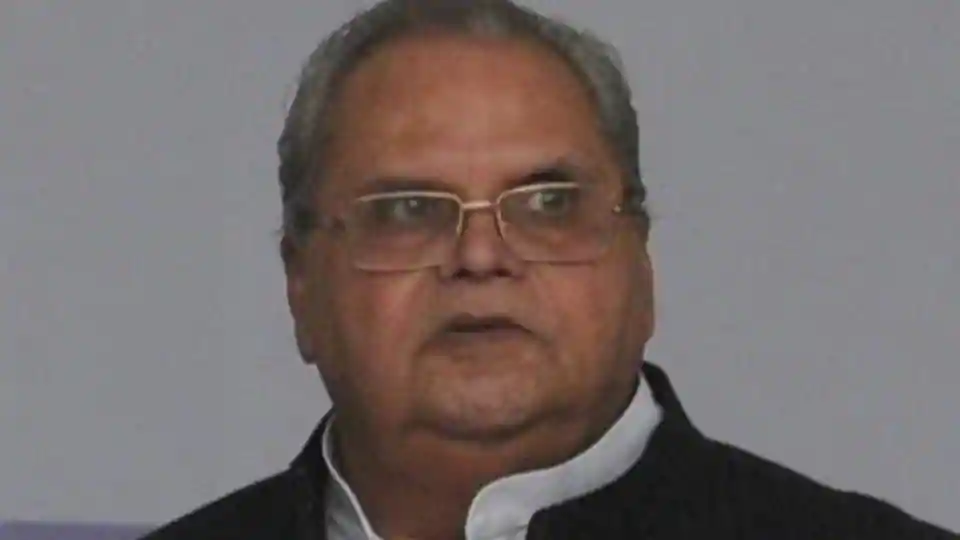No move to change permanent residency rules, J-K Gov tells Kashmir parties
Date:- 04 Dec 2018

Ashiq Hussain
Article 35A of the Constitution empowers the Jammu and Kashmir Assembly to define ‘permanent residents’ of the state who are eligible for special rights and privileges, which the legislature can provide.
Parties in Jammu and Kashmir on Sunday alleged governor Satya Pal Malik was trying to change rules for issuing permanent resident certificates - a touchy issue in the state. The governor, however, denied any move to tamper with the existing law.
Former chief minister and National Conference leader Omar Abdullah alleged that the governor’s “plan” reportedly to change the process for issuance of permanent resident certificate (PRC) was aimed at “distorting the demography” of the state, while People Conference President Sajad Gani Lone also urged the administration to “restrict itself to basic governance” and not to “invent new problems” for the state.
The regime in the state, which is currently under governor’s rule, is reportedly planning to change the existing process for acquiring permanent resident certificate in the state. It was, however, not clear what changes are being mulled. Senior Bharatiya Janata Party leader Kavinder Gupta had said there were moves to simplify the procedure and fixing a timeline for its issuance under the Public Services Guarantee Act, reported PTI news agency.
“We are obliged to write to you at a time when you are mulling changes to permanent resident certificate rules. Our party, the National Conference , is of the opinion that this is an attempt to distort the demography of the state and finds it detrimental to J&K’s special status,” Abdullah wrote in a letter to the governor.
“We hope that you roll back any decision made in this regard immediately. We also want to convey and register our displeasure and a unanimous decision to oppose this move,” he added.
Responding to Abdullah, Malik said, “At the outset I would like to mention that the government is not making or even considering any changes to the act governing permanent resident certificates in the state. It is an integral part of the legal structure of Jammu and Kashmir and there is no attempt whatsoever to tamper with this law.”
The governor clarified they were seeking comments from people for hassle-free issuance of the certificates to the genuine residents, as many applicants face “avoidable difficulties” in getting a PRC within the stipulated timeline of 30 days from the date of application and there were complaints of delays “due to a variety of procedural reasons”.
“This is a routine administrative matter and unnecessary meaning should not be read into it,” he said.
Abdullah had also taken a dig at Malik, who had dismissed former chief minister Mehbooba Mufti’s allegation that he had disregarded her fax staking claim to form a government before deciding to dissolve the house, saying that he was forced to share the letter online as the fax machine was still not working in the governor’s house. The Raj Bhavan later clarified that the fax of the letter was received and its receipt was confirmed to Abdullah’s adviser Tanvir Sadiq.
On the other hand, Lone, who had also staked claim to form the government, took to Twitter to attack the purported move on the PRCs.
“The governor’s administration needs to restrict itself to basic governance. No structural changes pertaining to PRC or J K Bank are acceptable. Restrict your energies to what u r mandated to do— which incidentally u r not doing. Please don’t invent new problems,” he tweeted.
The alleged move comes ahead of the Supreme Court’s scheduled January 2019 hearing on abunch of petitions against Article 35A of the Constitution, which empowers the state’s legislature to define “permanent residents” of the state and provide special rights and privileges to them.
The petitions have triggered anger across the state. There are fears that Article 370 and Article 35-A may be scrapped, which will allow non-residents to settle there. While Article 370 grants special status to Jammu and Kashmir, Article 35 A disallows people from the rest of India from buying or owning immovable property in the state, settling permanently, or getting state government jobs.
Abdullah also alleged that the state administrative council (SAC), which is headed by Malik, is unilaterally bringing changes in the working of institutions and procedures. He said that the change of procedures of issuing PRC was “objectionable and condemnable”.
“Moreover, this move comes at a time when the state does not have a popularly elected government. The assembly has been dissolved and elections are due within months. This makes the move of your administration open to question as we believe the role of the government is more in nature of a caretaker government,” he said.
The letter cautioned that “any misadventure by the SAC could disturb the fragile and precarious peace here”.
The Congress also said any changes in the procedure for granting PRCs in the state would be “unacceptable”, and would have serious implications, according to PTI
“This step will invent another problem in the state which has to be avoided in the larger interests of peace,” a Congress spokesperson said
The state came under governor’s rule on June 20 after the BJP pulled out of the coalition government with the People’s Democratic Party (PDP). An attempt to form government by NC, PDP and Congress failed last month when the governor dissolved the assembly.
On November 22, the decision of the governor to treat Jammu and Kashmir Bank as a Public Sector Undertaking (PSU) also created uproar in the restive state with political parties and civil society accusing the governor of trampling the autonomy of the institute and fiddling with special status of the state.
Courtesy: Hindustan Times; Dec 02,2018


